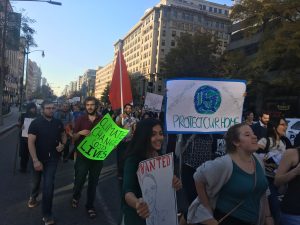On Nov. 14, the Environmental Future(s Initiative (EFI) hosted a panel in the Mortara Center for International Studies to discuss climate induced displacement and the future of environmental refugees.
The panel featured two environmental law experts, Alice Thomas, the climate displacement program manager for Refugees International, and Sofia Yazykova, a D.C. attorney who has worked with the Environmental Law Institute. The final panelist was Georgetown Assistant Anthropology Professor Mubbashir Rizvi, who spoke about how environmental migrations are often overlooked.
“We tend to think about environmental displacement and environmental refugees stemming out of moments of extreme weather conditions,” Rizvi said. “One of the things I’ve been thinking a lot about is to kind of push back how we only think about this within the parameters of very critical and extreme conditions rather than the kind of everyday displacement and movement happening all over the world.”
It’s easier grasp the numbers of single-instance displacements like hurricanes or earthquakes, but due to the widespread, long-term progression of environmentally forced migration, there’s a lack of reliable data. This issue is especially relevant for Thomas who, as an expert in her field, is left trying to explain the importance of the issue without any concrete statistical support.
“There are really no estimates, locally, for how many people are being affected today,” Thomas said. “Journalists call me all the time and are like, ‘we want to meet the climate refugees, where are the climate refugees?’ and I’m like, ‘well, they’re not all in one big camp somewhere.’”
Thomas said that people become climate refugees for a multitude of reasons and in a multitude of places around the world. Coastal communities are threatened by rising sea levels; landlocked farms wither and die in the absence of sufficient rainshowers. Environmental migration is an issue of all seasons and on all continents.
“I mean, it’s happening everywhere, all over, and we just don’t have a clear idea of where and when,” Thomas said. “We really don’t know what the extent of the problem is.”
Rizvi believes that the lack of data and lack of focus on climate displacement indicates a larger social trend.
“There’s a great divergence happening in our thinking about the environment,” Rizvi said. “On the one hand, we’re thinking of humanity as becoming more and more vulnerable as a whole, but on the other hand, we are also seeing a disconnect or breakdown of what it means to be human”
Thomas has also run into this disconnect. In working throughout the Middle East and Africa, she meets people without access to contemporary climate research, even as their communities are affected by climate change.
“There is a huge justice component of what’s happening because, invariably, those places impacted are the places least responsible for climate change,” Thomas said.
According to Thomas, in communities without access to current research on climate change, those affected still seek explanations. “That part of it is the most poignant part of my fieldwork,” Thomas said. “[It’s] going out in the field and seeing people who are being impacted and saying ‘why do you think the weather is changing?’ and women that are 70 years old telling me, ‘because God is angry at us.’ That’s not why this is happening.”
Human impact is what helped inspire Aaron Silberman (SFS ‘18) to found EFI, a non-hierarchical environmental student groups. In organizing this event, EFI sought to emphasize the many dimensions of climate change and its immediate impacts.
“The ethical implications of rising sea levels, melting ice caps, and increased desertification, among other manifestations of climate change, are too extraordinary to ignore,” Silberman said. “They call for proactive, just action.”
Action became a major focus of the panel. In the face of rapidly increasing rates of environmental degradation. Each panelist, and Silberman, spoke to the need for immediate action.
“It would be all too easy for people to become pessimistic about our chances to effectively mitigate and ethically adapt to a changing planet,” said Silberman. “We cannot afford to become pessimistic. Georgetown students, and citizens more generally, must push even harder for sound climate and energy policies in the face of denial and obstinance.”
Thomas also is optimistic. “We have an enormous opportunity in the short term to decide how our communities are actually going to decide to get access to climate information,” Thomas said.
This comes after months of political rhetoric generally avoiding climate issues. “I think one thing that was difficult to watch was the absence of discussion in the entire election process,” Rizvi said.
If the EFI has its way, that absence will not continue. In a series of talks throughout the year, the student group aims to bring environmental issues into the Georgetown student dialogue and increase climate literacy.
“Because we know so little about climate induced displacement, and because solutions to the multi-factorial, complicated challenge have not yet been created,” said Silberman, “it is vital that conversations continue regarding how the world can effectively respond to climate migrants.”
Those conversations will continue through the EFI, and so must student action, according to Thomas, regardless of whatever the presidential administration has in store.
“We don’t have time for four years for these people to decide whatever they’re going to decide,” Thomas said. “My big picture argument is, we have got to figure [it] out today.”






